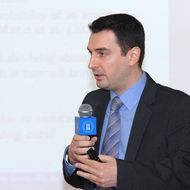- A
- A
- A
- ABC
- ABC
- ABC
- А
- А
- А
- А
- А
- HSE University
- Faculty of Economic Sciences
- Department of Theoretical Economics
- Events
- Department of Theoretical Economics research seminar with Daria Tabashnikova, HSE
-
Department
109028, Moscow,
Pokrovsky Boulevard 11, Rooms: S1029, S1030
Phone: +7 (495) 772-95-90*27172, 27174, 27601, 28270
The Department of Theoretical Economics brings together highly qualified specialists in various fields of economics, including micro and macroeconomics, monetary and financial theory, economic history and the history of economic thought. Our mission is to teach economic disciplines at HSE on the level of leading Western universities.
Karpov A. V., Markström K., Riis S. et al.
Discrete Applied Mathematics. 2025. Vol. 370. P. 57-70.
In bk.: Human-Centric Decision and Negotiation Support for Societal Transitions: 24th International Conference on Group Decision and Negotiation, GDN 2024, Porto, Portugal, June 3–5, 2024, Proceedings. Cham: Springer, 2024. P. 102-113.
Andreyanov P., Krasikov I., Suzdaltsev A.
arxiv.org. Theoretical Economics. Cornell University, 2024
109028, Moscow,
Pokrovsky Boulevard 11, Rooms: S1029, S1030
Phone: +7 (495) 772-95-90*27172, 27174, 27601, 28270

Department of Theoretical Economics research seminar with Daria Tabashnikova, HSE
Dear colleagues,
Department of Theoretical Economics invites you to attend the research seminar with Assistant and Ph.D student Daria Tabashnikova, HSE
Date: February 13, 2024
Time: 1:00 p.m.
Working language: English
· The link to the seminar:https://telemost.yandex.ru/j/15438072141094
Title: " The optimal design of elimination tournaments with a superstar "
Abstract: We study single- and double-elimination tournaments with heterogeneous players of two types: regular players and a superstar. Players choose efforts in each match with linear costs, winning with a probability calculated with the Tullock success function. We consider several designer maximization problems: total efforts, probability of winning the strongest player, and a weighted composed function. We show that a double-elimination tournament is less profitable in most cases, except when the tournament organizer is concerned about the probability that the superstar wins the tournament.
- About
- About
- Key Figures & Facts
- Sustainability at HSE University
- Faculties & Departments
- International Partnerships
- Faculty & Staff
- HSE Buildings
- Public Enquiries
- Studies
- Admissions
- Programme Catalogue
- Undergraduate
- Graduate
- Exchange Programmes
- Summer Schools
- Semester in Moscow
- Business Internship
-
https://elearning.hse.ru/en/mooc/
Massive Open Online Courses
-
https://www.hse.ru/en/visual/
HSE Site for the Visually Impaired
-
http://5top100.com/
Russian Academic Excellence Project 5-100
- © HSE University 1993–2025 Contacts Copyright Privacy Policy Site Map
- Edit






